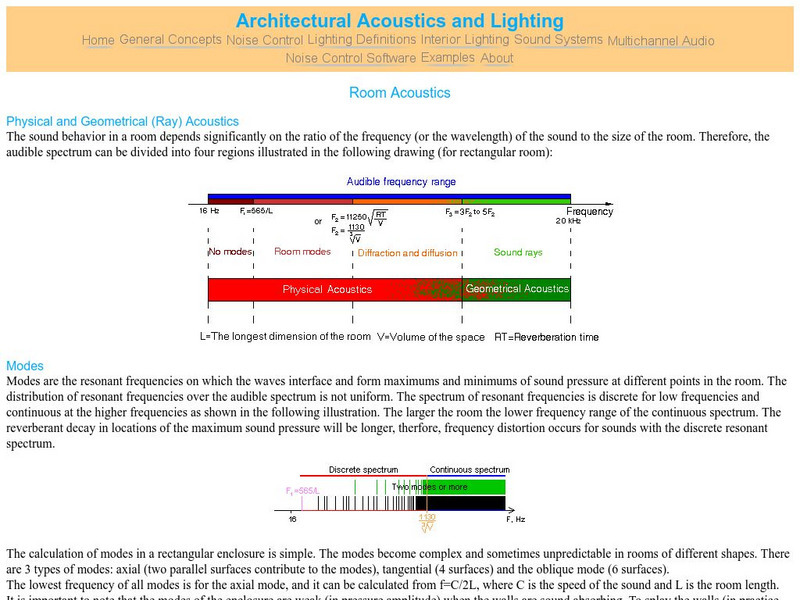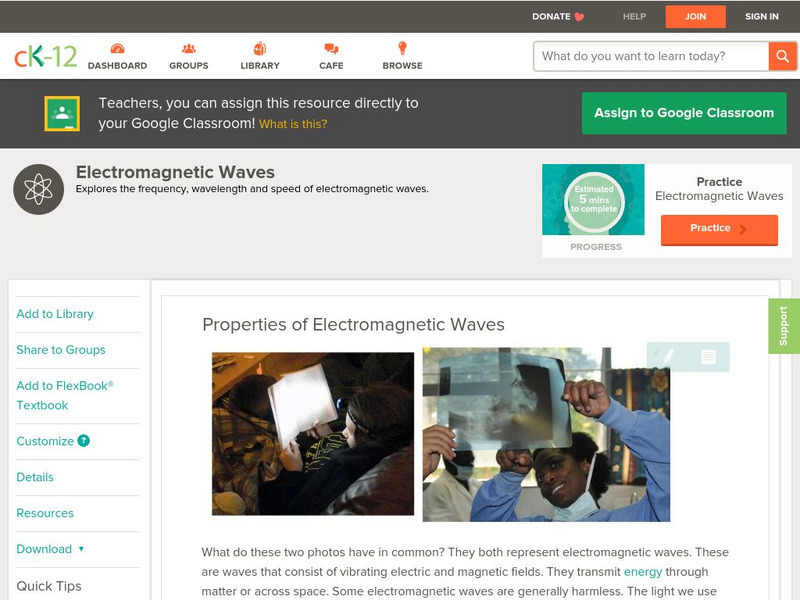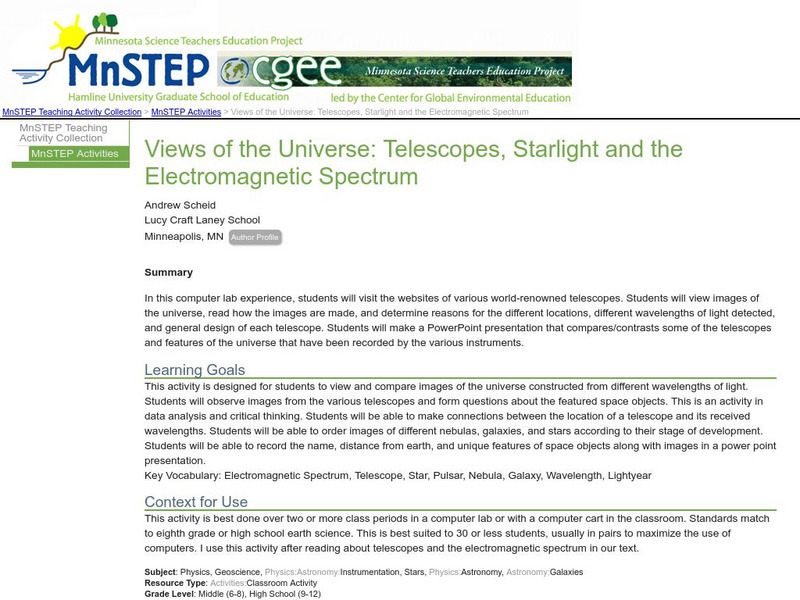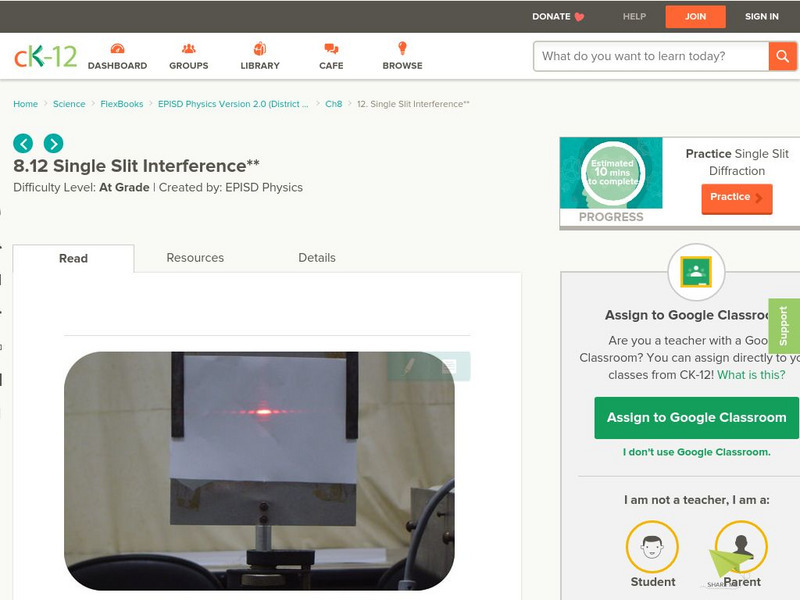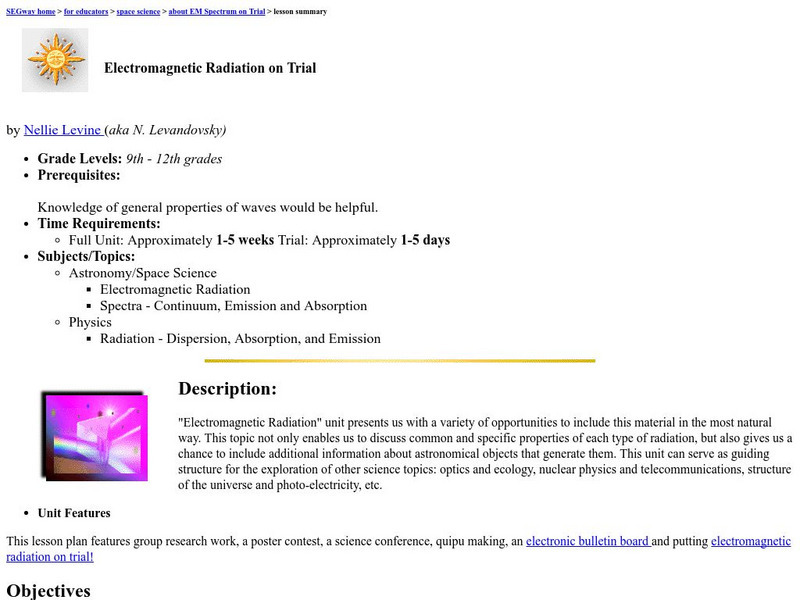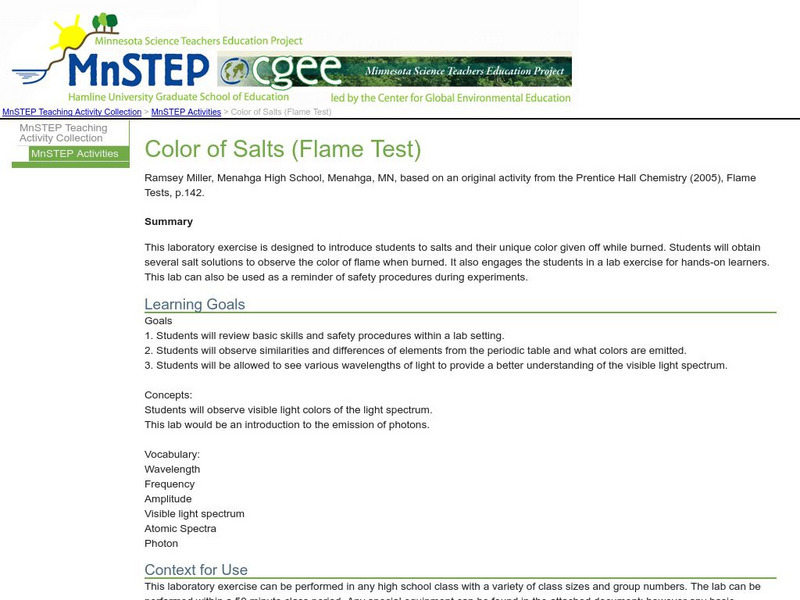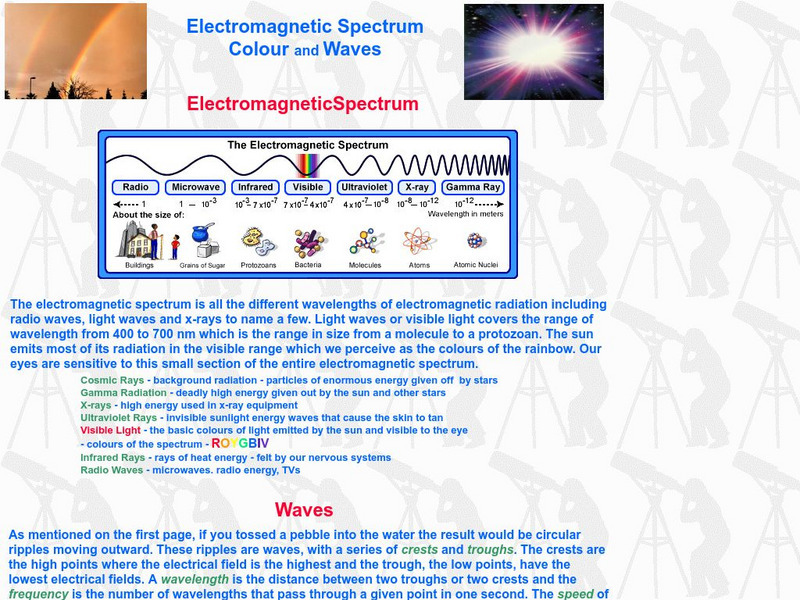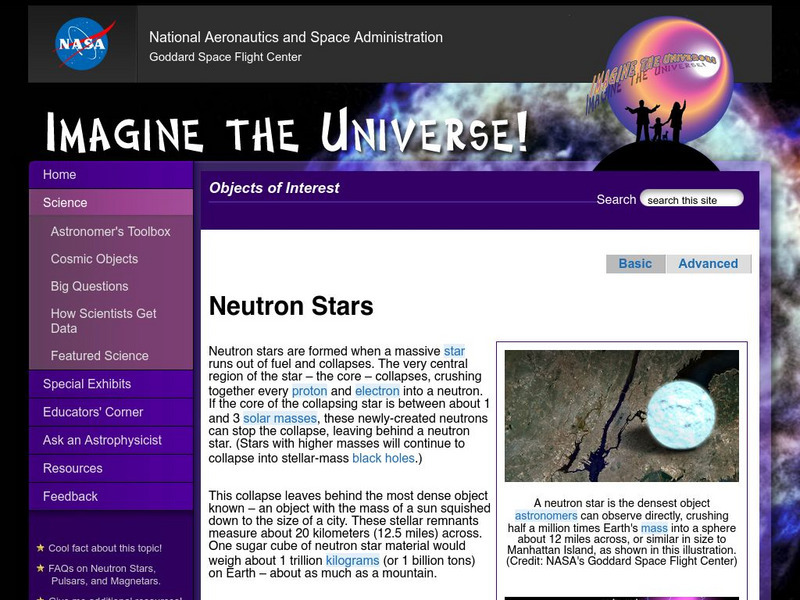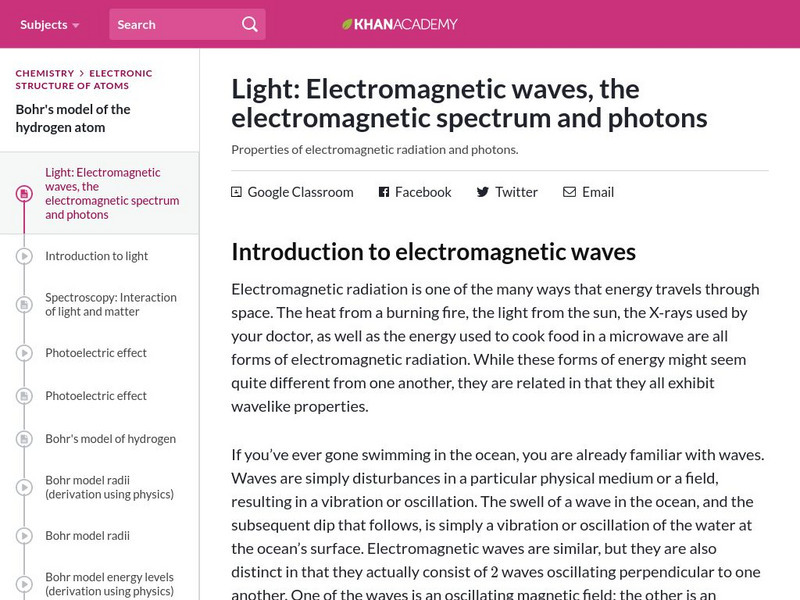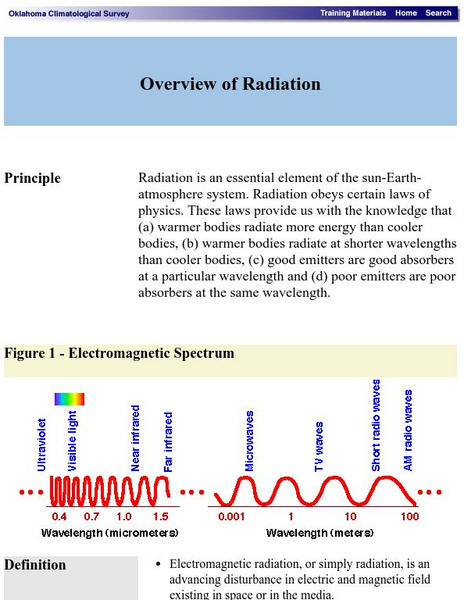NASA
Nasa: Imagine the Universe: Welcome to the World of Multiwavelength Astronomy!
This Imagine the Universe site provides an introduction into the multiwavelength universe and astronomy. Site provides graphics, links to a quiz, facts on this topic as well as teacher resources.
Other
Architectural Acoustics and Lighting: Room Acoustics
This site from Architectural Acoustics and Lighting provides a discussion of various factors affecting the acoustics of a given room. Room dimensions, the wavelength of the sound wave, the physical characteristics of the walls, the...
University of Colorado
University of Colorado: Physics 2000: Cat Scans: Projecting Shadows
This page and the three pages which follow discuss how X-ray technology can be used to produce an image of the human body. Discussion is understandable and highly intriguing. Several interactive animations allow the visitor to explore...
University of Colorado
University of Colorado: Physics 2000: More About Visualizing Electromagnetic Waves
Discusses the nature of an electromagnetic wave. Explains the oscillating electric field and represents it through clever graphics and animations.
CK-12 Foundation
Ck 12: Physical Science: Properties of Electromagnetic Waves
[Free Registration/Login may be required to access all resource tools.] The speed of electromagnetic waves, their wavelengths and frequencies and how to calculate wavelength or wave frequency.
Science Education Resource Center at Carleton College
Serc: Views of the Universe: Telescopes, Starlight, Electromagnetic Spectrum
Students visit the websites of various world-renowned telescopes, view images of the universe, read how the images are made, and determine reasons for the different locations, different wavelengths of light detected, and general design...
American Association of Physics Teachers
Com Padre Digital Library: Open Source Physics: Multiple Slit Diffraction Model
Simulation that shows the diffraction of light through single or multiple slits. Simulation allows modification of the number of slits, slit width, slit separation, and the wavelength.
CK-12 Foundation
Ck 12: Single Slit Interference
[Free Registration/Login may be required to access all resource tools.] Explains what causes single slit interference of light and how to find the wavelength of a single slit interference pattern using a formula.
CK-12 Foundation
Ck 12: Double Slit Interference
[Free Registration/Login may be required to access all resource tools.] Explains the terms diffraction, interference, and interference patterns. Describes the double slit experiment and how to determine the wavelength of a double slit...
Trinity College Dublin
The History of Mathematics: Young
A short sketch of the life and work of Thomas Young (1773-1829 CE). Traces early upbringing and education and his scientific discoveries and contributions.
University of California
Center Science Edu.: Electromagnetic Radiation on Trial
Here is a 1-5 day unit on electromagnetic radiation that features a teacher guide and student activities with extensions.
TeachEngineering
Teach Engineering: Thirsty for Gold
Student teams conduct an experiment that uses gold nanoparticles as sensors of chemical agents to determine which of four sports drinks has the most electrolytes. In this way, students are introduced to gold nanoparticles and their...
Georgia State University
Georgia State University: Hyper Physics: Wave Motion
Two wave graphs depicting a sine wave and relating the various characteristics (wavelength, amplitude, frequency, and period) of a wave to each other. The site includes an interactive JavaScript form in which the visitor enters one...
University of California
U.c. Berkeley: Spectra From Space
View the entire spectrum of electromagnetic radiation and get information on telescopes especially designed to view different wavelengths of the spectrum.
Science Education Resource Center at Carleton College
Serc: Color of Salts Flame Test
This laboratory exercise is designed to introduce students to salts and their unique color given off while burned. Students will obtain several salt solutions to observe the color of flame when burned.
My Science Site
Electromagnetic Spectrum: Colour and Waves
This resource provides information on the different wavelengths that make up the electromagnetic spectrum. Also contains information on waves and color.
NASA
Nasa: Imagine the Universe: Neutron Stars and Pulsars
Discover what neutron stars and pulsars are and view pictures of them. Includes links to additional resources and lesson plans.
Texas Instruments
Texas Instruments: Blackbody Radiation
This program will produce the blackbody radiation curve for one or two objects when the student inputs the temperature(s) in kelvin. The program will also display on the curve the peak frequency and wavelength when one object is selected.
Georgia State University
Georgia State University: Hyper Physics: Mirrors in Imaging
A discussion from Georgia State University of different types of mirrors and the images which they create. Discusses different instruments which use mirrors to produce images.
Khan Academy
Khan Academy: Electromagnetic Waves: The Electromagnetic Spectrum and Photons
An article that discusses the coupling of an electric field with a magnetic field to create electromagnetic waves. Article also discusses how different types of electromagnetic waves have different wavelengths which forms the...
Curated OER
Georgia State University: Color
This site from Georgia State University discusses the location of visible light on the electromagnetic spectrum. Includes the wavelength values for various colors of light within the visible light spectrum.
Curated OER
Georgia State University: Color
This site from Georgia State University discusses the location of visible light on the electromagnetic spectrum. Includes the wavelength values for various colors of light within the visible light spectrum.
Oklahoma Mesonet
Oklahoma Climatological Survey: Overview of Radiation
This site details what radiation is, the physics of radiation, and radiative transfer as it occurs in nature. Content explores the electromagnetic spectrum, electromagnetic waves, properties of radiation, and solar radiation.
NASA
Viewing the Violent Universe: What Are Gamma Rays?
The universe produces a broad range of light, only a fraction of which is visible to our eyes. Gamma rays are nonvisible light, which also includes x-rays, ultraviolet light, infrared radiation, and radio waves.

